新概念英语第一册lesson85-86
- 格式:ppt
- 大小:18.64 MB
- 文档页数:48
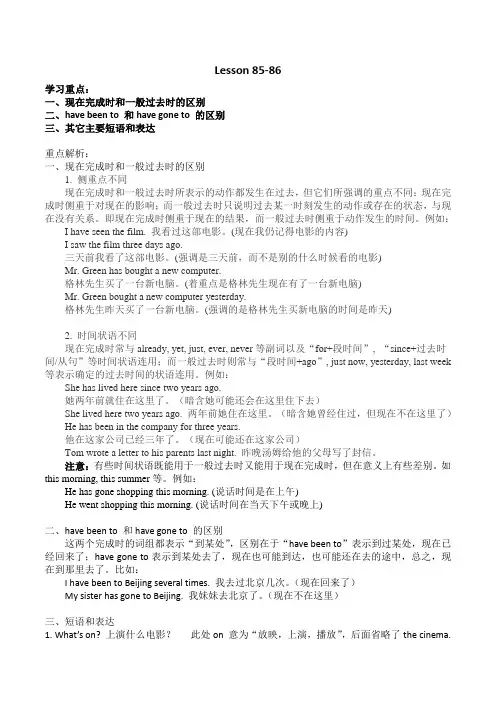
Lesson 85-86学习重点:一、现在完成时和一般过去时的区别二、have been to 和have gone to 的区别三、其它主要短语和表达重点解析:一、现在完成时和一般过去时的区别1. 侧重点不同现在完成时和一般过去时所表示的动作都发生在过去,但它们所强调的重点不同:现在完成时侧重于对现在的影响;而一般过去时只说明过去某一时刻发生的动作或存在的状态,与现在没有关系。
即现在完成时侧重于现在的结果,而一般过去时侧重于动作发生的时间。
例如:I have seen the film. 我看过这部电影。
(现在我仍记得电影的内容)I saw the film three days ago.三天前我看了这部电影。
(强调是三天前,而不是别的什么时候看的电影)Mr. Green has bought a new computer.格林先生买了一台新电脑。
(着重点是格林先生现在有了一台新电脑)Mr. Green bought a new computer yesterday.格林先生昨天买了一台新电脑。
(强调的是格林先生买新电脑的时间是昨天)2. 时间状语不同现在完成时常与already, yet, just, ever, never等副词以及“for+段时间”, “since+过去时间/从句”等时间状语连用;而一般过去时则常与“段时间+ago”, just now, yesterday, last week 等表示确定的过去时间的状语连用。
例如:She has lived here since two years ago.她两年前就住在这里了。
(暗含她可能还会在这里住下去)She lived here two years ago. 两年前她住在这里。
(暗含她曾经住过,但现在不在这里了)He has been in the company for three years.他在这家公司已经三年了。
(现在可能还在这家公司)Tom wrote a letter to his parents last night. 昨晚汤姆给他的父母写了封信。
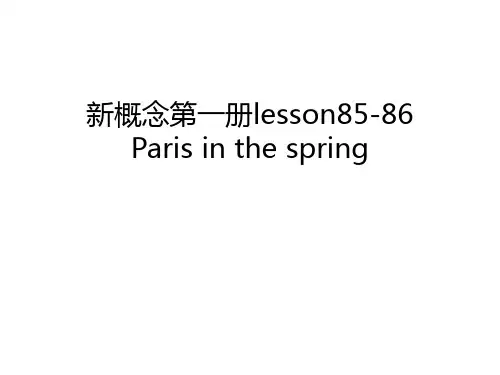
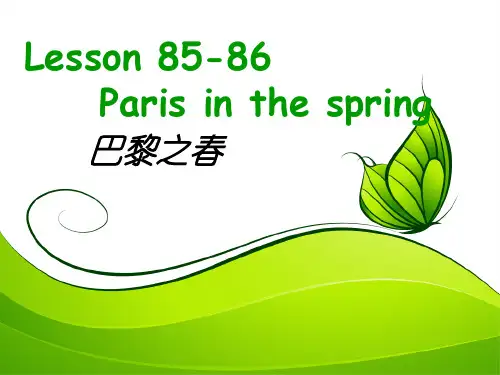
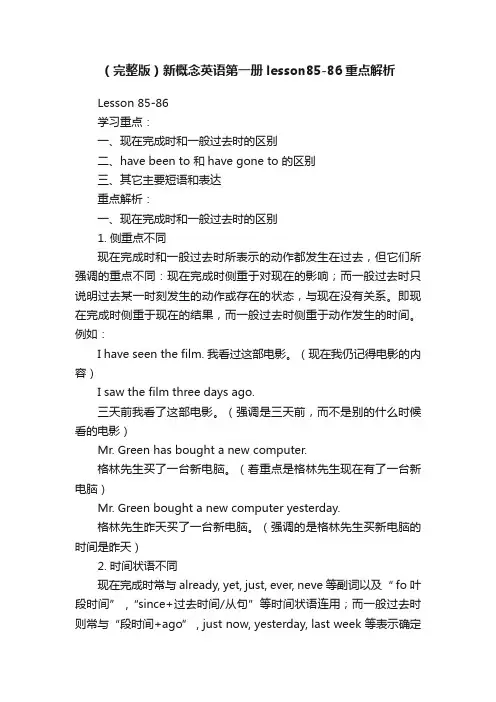
(完整版)新概念英语第一册lesson85-86重点解析Lesson 85-86学习重点:一、现在完成时和一般过去时的区别二、have been to 和have gone to 的区别三、其它主要短语和表达重点解析:一、现在完成时和一般过去时的区别1. 侧重点不同现在完成时和一般过去时所表示的动作都发生在过去,但它们所强调的重点不同:现在完成时侧重于对现在的影响;而一般过去时只说明过去某一时刻发生的动作或存在的状态,与现在没有关系。
即现在完成时侧重于现在的结果,而一般过去时侧重于动作发生的时间。
例如:I have seen the film. 我看过这部电影。
(现在我仍记得电影的内容)I saw the film three days ago.三天前我看了这部电影。
(强调是三天前,而不是别的什么时候看的电影)Mr. Green has bought a new computer.格林先生买了一台新电脑。
(着重点是格林先生现在有了一台新电脑)Mr. Green bought a new computer yesterday.格林先生昨天买了一台新电脑。
(强调的是格林先生买新电脑的时间是昨天)2. 时间状语不同现在完成时常与already, yet, just, ever, neve等副词以及“ fo叶段时间” ,“since+过去时间/从句”等时间状语连用;而一般过去时则常与“段时间+ago” , just now, yesterday, last w eek 等表示确定的过去时间的状语连用。
例如:She has lived here since two years ago.她两年前就住在这里了。
(暗含她可能还会在这里住下去)She lived here two years ago.两年前她住在这里。
(暗含她曾经住过,但现在不在这里了)He has been in the company for three years.他在这家公司已经三年了。
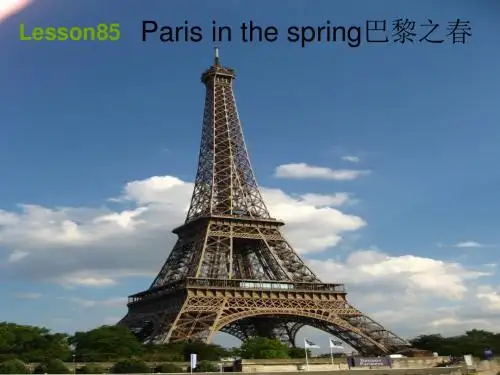
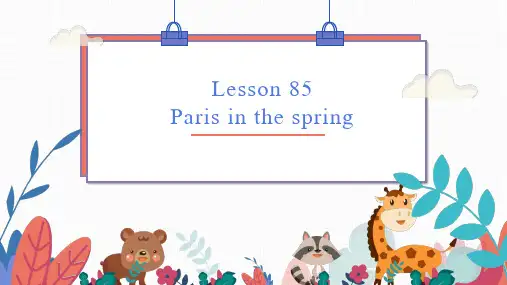
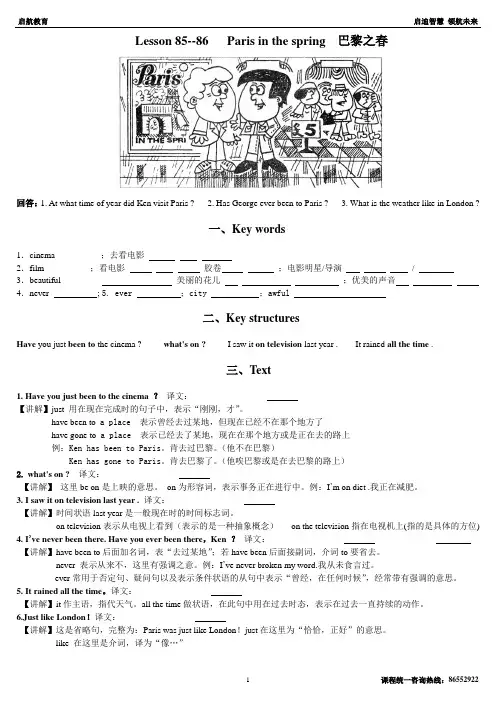
Lesson 85--86 Paris in the spring 巴黎之春回答:1. At what time of year did Ken visit Paris ? 2. Has George ever been to Paris ? 3. What is the weather like in London ?一、Key words1.cinema __________;去看电影2.film __________;看电影胶卷;电影明星/导演/3.beautiful _________ 美丽的花儿;优美的声音4.never ; 5. ever ;city ;awful二、Key structuresHave you just been to the cinema ? what's on ? I saw it on television last year . It rained all the time .三、Text1. Have you just been to the cinema ?译文:_________________ _________________【讲解】just 用在现在完成时的句子中,表示“刚刚,才”。
have been to a place 表示曾经去过某地,但现在已经不在那个地方了have gone to a place 表示已经去了某地,现在在那个地方或是正在去的路上例:Ken has been to Paris。
肯去过巴黎。
(他不在巴黎)Ken has gone to Paris。
肯去巴黎了。
(他唉巴黎或是在去巴黎的路上)2. what's on ? 译文:_________________ __【讲解】这里be on是上映的意思。
on为形容词,表示事务正在进行中。
例:I’m on diet .我正在减肥。
3.I saw it on television last year .译文:_________________ _________________【讲解】时间状语last year是一般现在时的时间标志词。
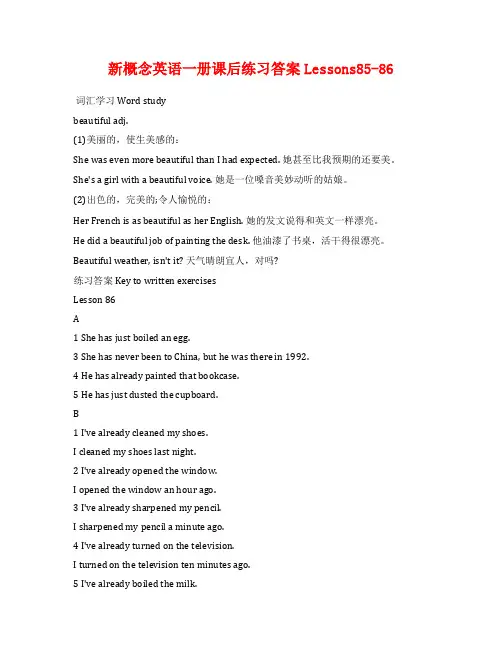
新概念英语一册课后练习答案Lessons85-86词汇学习 Word studybeautiful adj.(1)美丽的,使生美感的:She was even more beautiful than I had expected. 她甚至比我预期的还要美。
She's a girl with a beautiful voice. 她是一位嗓音美妙动听的姑娘。
(2)出色的,完美的;令人愉悦的:Her French is as beautiful as her English. 她的发文说得和英文一样漂亮。
He did a beautiful job of painting the desk. 他油漆了书桌,活干得很漂亮。
Beautiful weather, isn't it? 天气晴朗宜人,对吗?练习答案 Key to written exercisesLesson 86A1 She has just boiled an egg.3 She has never been to China, but he was there in 1992.4 He has already painted that bookcase.5 He has just dusted the cupboard.B1 I've already cleaned my shoes.I cleaned my shoes last night.2 I've already opened the window.I opened the window an hour ago.3 I've already sharpened my pencil.I sharpened my pencil a minute ago.4 I've already turned on the television.I turned on the television ten minutes ago.5 I've already boiled the milk.I boiled the milk yesterday morning.6 I've already emptied the basket.I emptied the basket yesterday.7 I've already asked a question.I asked a question two minutes ago.8 I've already typed that letter.I typed that letter this morning.9 I've already washed my hands.I washed my hands five minutes ago.10 I've already walked across the park.I walked across the park an hour ago.11 I've already painted that bookcase.I painted that bookcase a year ago.12 I've already dusted the cupboard.I dusted the cupboard this afternoon.。
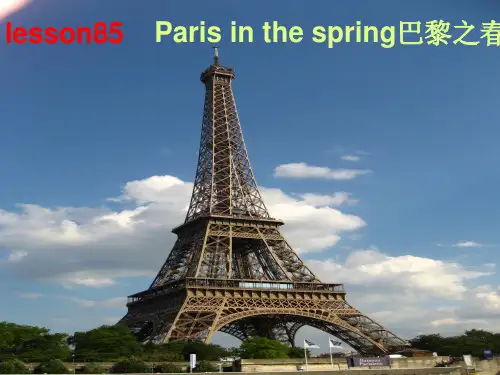
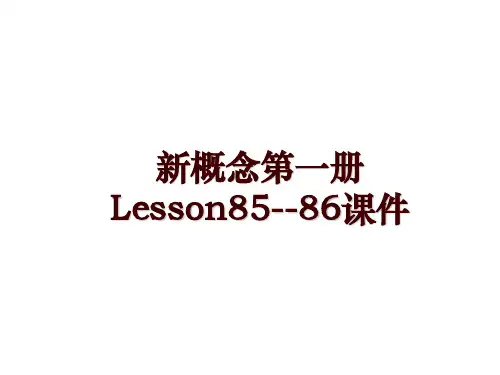
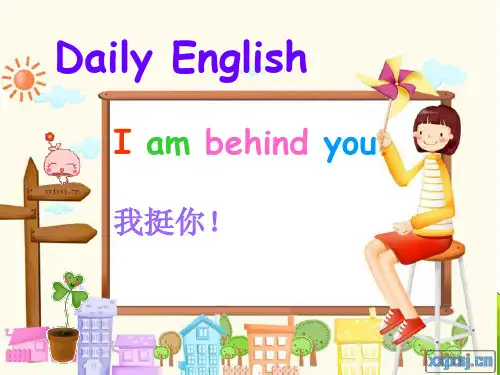
Lesson 85-86Pairs in the springGEORGE: Hello, Ken.KEN: Hi, George.GEORGE: Have you just been to the cinema?KEN: Yes, I have.GEORGE: Wha'st on? KEN:‘Paris in the spring'.GEORGE: Oh',vIe already seen it.I saw it on television last year.It 's an old filbmu,t it 's very good.KEN: Paris is a beautiful city.GEORGE:'vIe never been there.Have you ever been there, Ken?KEN: Yes, I have. I was there in April.GEORGE: Pairs in the spring, eh?KEN: It was spring, but the weather was awful.It rained all the time.GEORGE: Just like London!1. Have you just been to the cinema?1)这是现在完成时的一般疑问句,主语是you,助动词用have.2)just 刚刚,刚才(通常与完成时连用,有时也与过去时连用)--He has just bought a second hand car.--We just arrived.--just “正要…” “刚要….”(常用进行时或be going to do连用) --I am just making tea for you.--She was just about to fall asleep when the telephone rang.3)have been to a place表示曾经去过某地,但现在不在那个地方了,去而复归;have gone to a place表示己经去某地了,现在在那个地方或正在去的路上,去而未归--George has been to Paris.--George has gone to Paris.--Have you ever been to America?--Has he gone go Washington D.C.?--I have been to the library.--H e has gone to the library.4)have bee to the cinema 表示去过电影院--have been to the park 去过公园但在名词school, work, church 之前不加定冠词,它们所表示的是一种抽象概念而不是具体地点或位置。
新概念第一册Lesson85-86知识点及拓展Lesson 85-86Pairs in the springGEORGE: Hello, Ken.KEN: Hi, George.GEORGE: Have you just been to the cinema?KEN: Yes, I have.GEORGE: What’s on?KEN: ‘Paris in the spring’.GEORGE: Oh, I’ve already seen it.I saw it on television last year.It’s an old film, but it’s very good.KEN: Paris is a beautiful city.GEORGE: I’ve never been there.Have you ever been there, Ken?KEN: Yes, I have. I was there in April.GEORGE: Pairs in the spring, eh?KEN: It was spring, but the weather was awful.It rained all the time.GEORGE: Just like London!1. Have you just been to the cinema?1)这是现在完成时的一般疑问句,主语是you,助动词用have.2)just 刚刚,刚才(通常与完成时连用,有时也与过去时连用)--He has just bought a second hand car.--We just arrived.--just “正要…”“刚要….”(常用进行时或be going to do 连用) --I am just making tea for you.--She was just about to fall asleep when the telephone rang. 3)have been to a place表示曾经去过某地,但现在不在那个地方了,去而复归;have gone to a place表示己经去某地了,现在在那个地方或正在去的路上,去而未归。